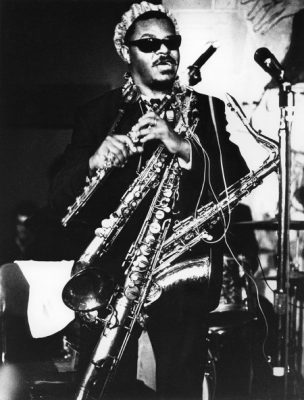.
.

Rahsaan Roland Kirk at the Jazz Workshop, San Francisco
April, 1967
(photo by permission Veryl Oakland)
.
.
FROM FLYTOWN
When I die I want them to play the Black and Crazy Blues, I want to be cremated, put in a bag of pot and I want beautiful people to smoke me and hope they got something out of it.
. -Rahsaan Roland Kirk
.
Born in Flytown, he was also a bird.
His avian comic ranting belied
a deadly serious cat Hank Crawford
said was tearin’ up the joint at 15.
When he was two years old he lost his sight.
At the Ohio State School for the Blind,
he really began to wail with Boyd Moore.
When he dreamed, he could see, and what he saw
were instructions to change the N to L –
the dream said you are Roland not Ronald.
The dream went on to say You are Rahsaan,
classical player – Saint-Saens, Hindemith,
Tchaikovsky, Dvorak, Black Classical.
He was no sideman, Rahsaan Roland Kirk,
with three or four instruments around his neck.
What you got, Rahsaan, hanging ‘round your neck?
Tenor saxophone, stritch, a manzello.
I will play all these horns at once, and I
will breath in circles and sustain a note
from here out to as far as you can see.
The 5,000-pound man plays mystery pipes,
alarm clocks, sirens, bells, a garden hose,
The 5,000-pound man plays a nose flute.
When your dream has three sides there’s got to be
a secret message hidden there in the blanks.
Born in Flytown, he was also a bird;
he really began to wail with Boyd Moore.
Tchaikovsky, Dvorak, Black Classical,
breathing in circles to sustain a note,
a secret message hidden there in the blanks
.
.
.
FROM FLYTOWN TO THE THREE-SIDED ROOM
Rahsaan’s music was rooted in hard bop and soul.
He mixed up politics with free jazz and with soul.
Monologues were satiric, his humor absurd.
His knowledge of jazz’s history brimmed with soul.
Ragtime to swing to free jazz — Rahsaan soaked it in;
he absorbed classical music, it’s mythic soul.
He’d harmonize with himself, circular breathing,
all three horns around his neck, around his big soul.
He said he was playing what he heard in his head,
a one-man horn section bearing his earthly soul.
Bright moments that reflected Smokey Robinson,
Duke Ellington, and John Coltrane’s deep seething soul.
Among his instruments there was the human voice –
he’d sing into a flute while he played, lifting souls.
All of these within reach – the nose flute, and whistles,
a gong, a clarinet, a complex goldsmith’s soul.
In the halls of the three-sided dream things are found —
backwards tapes, Holiday, computers without soul.
Rahsaan threatens to pull the plug on the machine
that tries to tell him what he should do with his soul.
In 1977 we lost Rahsaan.
The stroke took his body, John, but not his lithe soul.
.
.
___
.
.

John L. Stanizzi’s full-length collections are Ecstasy Among Ghosts, Sleepwalking, Dance Against the Wall, After the Bell, Hallalujah Time!, and High Tide-Ebb Tide. His work is widely published and has appeared in Prairie Schooner, Rattle, New York Quarterly, American Life in Poetry, and many others. Chants, his latest book, will be out this summer.
.
.
.
.
.





























Two fine poems. I love seeing the ghazal. First-rate work.
Thank you very, very much, Michael. Most appreciated.
-John Stanizzi
Yes, such fine poems. Such celebration.
Thank you very much, Robert. I really appreciate it.
Thank you.
-John L. Stanizzi